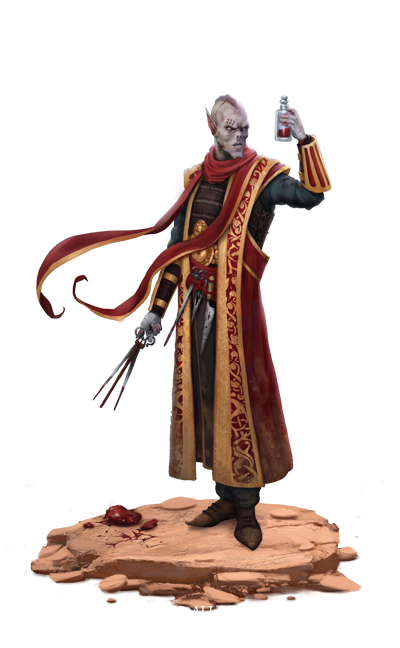
All Shall Be Skorne

Last week we introduced you to the eastern lands claimed by the skorne. This week, we explore the caste system that pervades and shapes the rigidly stratified culture of the Skorne Empire.
Castes are chosen before careers and help define a character, including who that character would consider superiors, equals, or beneath notice. Skorne with the same goals but of different castes often have trouble working with one another.

This hierarchy is very well defined and strictly adhered to. From social interactions with NPCs to determining which character is in charge of an adventuring company, a character’s caste defines how that character is viewed among all skorne.
Birth places each skorne into one of the three main castes, and nearly all remain in that caste for life. Each slave does have a chance, albeit an extremely slim one, to rise and join a higher caste; conversely, members of conquered houses, fallen heroes, and enemies taken in battle are relegated to the slave caste regardless of their origins.
Life within the slave caste is harsh even by skorne standards. Earning no glory and suffering abundant pain throughout their existence, slaves labor at the most menial and backbreaking tasks. The slave caste is considered by the skorne to be a normal, traditional aspect of their society, crucial to the vitality of each house and the empire as a whole.
The worker caste is allotted more freedom—and subjected to less pain—than the slaves, handling a wide range of essential functions. Workers who show promise in the art of cultivating agony in others may be given the opportunity to join the paingiver caste, an elevated status within the worker caste. Paingivers are skorne whose talents lie in their specialized manipulation of the body and their ability to induce excruciating pain upon living flesh. Those drawn into this caste are treated with a measure of respect and even fear by their fellow skorne. With their faces hidden by ornate masks of bronze, paingivers are the torturers, beast handlers, and shadowy assassins of the empire.

Workers who dedicate themselves to the veneration and lore of their ancestors may earn a chance to join the ranks of the extollers caste, which occupies the highest positions within the worker caste. As devoted students of mortitheurgy, extollers endeavor to perfect the arcane manipulation of spiritual essence. They are capable of preserving the spirit of worthy skorne who fall in battle, and they can rend the soul of an enemy with a lethal gaze from the crystal orb that replaces one of their eyes.
The highest caste, that of the warrior, is populated by the most skilled, honored, and feared members of skorne society. Whether as birthright or through exceptional martial skill, warriors have virtually limitless options open to them. They may seek immortality on the field of battle, command conquering armies, or jockey for positions of authority within their house, potentially seizing leadership of the house itself.
At the other end of the spectrum, below even the slaves, are the outcasts. These are skorne who, having committed heinous or ignoble acts, have been stripped of their caste standing altogether. Outcasts are shunned by skorne society and live in constant fear of discovery, for if they are found out and apprehended, public torture and execution awaits them.
Whatever their caste, all skorne are expected to faithfully and stoically serve the empire and, regardless of pain or deprivation, strive for the greater glory for their house. Some skorne rise to honor and prominence through might of arms, some through luck or sheer perseverance, and some through the deadly magic known as mortitheurgy.
Next time, we’ll look at this magic and how different the skorne truly are when it comes to the arcane crafts.
